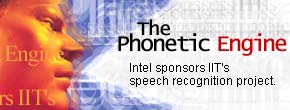

|
|
|
|
| HOME | INFOTECH | HEADLINES | |||
|
August 24, 1999
HEADLINES
|
 Shobha Warrier
Shobha Warrierin Madras Intel Asia has sponsored a five-year development programme in the Speech and Vision Lab of the Indian Institute of Technology here.
Professor Yegnanarayana heads the speech lab. Yesterday, the 'phonetic engine' lab was inaugurated on the IIT campus here by Professor U R Rao, member and former chairman of the Indian Space Research Organisation, along with R Sivakumar, director of the Intel Technology Centre. IIT-Madras has had a Speech and Vision Lab in its Department of Computer Science and Engineering since the early Eighties. Thirteen students have done their PhD work in this lab already and their work has attracted peer recognition. Professors and scholars working in the department have presented about 175 papers in international journals and conferences. Speech recognition has been receiving increased attention for use in man-machine interfaces. At the inauguration, Professor Yegnanarayana pointed out that with communication becoming crucial in today's world, speech technology is growing in importance. Speech technology in India has its own challenges because the sub-continent is home to at least 20 major languages. China is much ahead of India in speech technology primarily because the nation has only one language to deal with. A big promise of speech technology is in overcoming the difficult problem of user identification and authentication. Identification and authentication procedures that are popular now involve passwords and codes on magnetic media like swipe cards. But these can be stolen. Speech technology, however, can enable recognition of the unique voice of an individual and his speech pattern. This is a much more reliable authentication method. Voice recognition could also be used along with biometric controls like palm prints for authentication purposes. Good speech technology should bring about conveniences like just 'asking' a teller machine for the cash in your account! Translation between different languages is another significant application of speech technology. ISRO's Professor U R Rao said that at the national level there has been a lot of attention for technologies that can build cross-language connections for literature and cinema. He pointed out that "Spectacular developments in speech and image analysis and automatic speech translation using state-of-art neural networks are the outcome of chip technology." Sivakumar of Intel said "Speech recognition enables people to access the Internet and interact with data and applications on a PC without having to laboriously learn how to input Hindi on a keyboard. With over 25 languages in India, our objective with this program is to encourage development of speech enabled software solutions for Indian languages and accelerate the development of speech recognition technology in India." Yegnanarayana assured reporters that Intel has not put forward any conditions binding down the lab for the facilities and support that it has extended. Intel just expects that the machines provided by them will be only used for the project. Dr Natarajan, director of IIT-Madras reminded Intel that when academia interacts with industry, the industry also gets benefits. "After all, the Asia Week ranked IIT-Madras as one of the top five academic institutions in the Asia-Pacific region." With an agenda to promote technology in India, Intel Asia established the Intel India Technology Centre in 1996 and as a part of that programme they began supporting research activity in Indian universities and institutes. The Technology Centre's activity largely involves working with software developers, system integrators, technologists and academicians to provide expertise and technology that Intel has. They have already set up five labs in India that include research programmes at the Indian Institutes of Technologies of Delhi, Bombay and Madras. Intel also supports research activity at the Indian Institute of Science in Bangalore and the National Centre for Software Technology in Bombay. Tomorrow: Interview with Professor Yegnanarayana Related site: Tell us what you think |
||
|
HOME |
NEWS |
BUSINESS |
SPORTS |
MOVIES |
CHAT |
INFOTECH |
TRAVEL |
SINGLES BOOK SHOP | MUSIC SHOP | GIFT SHOP | HOTEL RESERVATIONS | WORLD CUP 99 EDUCATION | PERSONAL HOMEPAGES | FREE EMAIL | FEEDBACK |